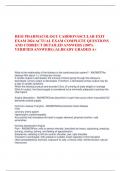HESI PHARMACOLOGY CARDIOVASCULAR EXIT
EXAM 2024 ACTUAL EXAM COMPLETE QUESTIONS
AND CORRECT DETAILED ANSWERS (100%
VERIFIED ANSWERS) |ALREADY GRADED A+
What is the relationship of the kidneys to the cardiovascular system? - ANSWERThe
kidneys filter about 1 L of blood per minute.
If cardiac output is decreased, the amount of blood going through the kidneys is
decreased; urinary output is decreased. Therefore, a decreased urinary output may be
a sign of cardiac problems.
When the kidneys produce and excrete 0.5mL of urine/kg of body weight or average
30mL/hr output, the blood supply is considered to be minimally adequate to perfuse the
vital organs
Angina description - ANSWERChest discomfort or pain that occurs when myocardial O2
demands exceed supply
Common causes of angina - ANSWERAtherosclerotic heart disease
HTN
coronary artery spasm
Hypertrophic cardiomyopathy
Any activity that increases the heart's oxygen demand; physical exertion, cold
extremities
Nursing assessment Angina
Pain - ANSWERPain: mild to severe intensity, described as heavy, squeezing, pressing,
burning, choking, aching, and feeling of apprehension
Substernal, radiating to left arm and/or shoulder, jaw, right shoulder
Transient or prolonged, with gradual or sudden onset; typically of short duration
Often precipitated by exercise, exposure to cold, a heavy meal, mental tension, sexual
intercourse
,Relieved by rest and/or nitroglycerin
Nursing assessment angina continued - ANSWERDyspnea, tachycardia, palpitations
N/V
Fatigue
Diaphoresis, pallor, weakness
Syncope
Dysrhythmias
Angina
Diagnostic info - ANSWERECG: is generally at client baseline unless taken during
anginal attack, when ST segment depression and T wave inversion may occur
Exercise stress test: shows ST segment depression and hypotension
Stress echo: looks for changes in wall motion (indicated in women)
Coronary angiogram: detects coronary artery spams
Cardiac cath: detects arterial blockage
Risk factors angina - ANSWERNonmodifiable
Heredity
Gender: male > female until menopause, then equal risk
Ethnic background: African Americans
Age
Modifiable: hyperlipidemia
Total serum cholesterol above 300 mg/dl: four times greater risk for developing
coronary artery disease than those with levels less than 200.
LDLs: <100 desirable
HDLs: >60 desirable
HTN, cigarette smoking, obesity, physical inactivity, DM, stress
Nursing plans and interventions
Angina - ANSWERMonitor meds and instruct client in proper administration
Determine factors precipitating pain, and assist client and family in adjusting lifestyle to
decrease these factors
Teach risk factors, and identify client's own risk factors
What to do during anginal attack: - ANSWERProvide immediate rest
Take vitals
Record ECG
Administer no more than 3 nitroglycerin tabs 5 mins apart
Seek emergency treatment if no relief has occurred after taking nitro
Angina
Physical activity - ANSWERTeach avoidance of isometric activity
Implement an exercise program
, Teach that sexual activity may be resumed after exercise is tolerated, usually when able
to climb two flights of stairs without exertion. Nitroglycerin can be taken prophylactically
before intercourse
Provide nutritional info about modifying fats (saturated) and sodium. Antilipemic meds
may be prescribed to lower cholesterol
Medical interventions
Angina - ANSWERPercutaneous transluminal coronary angioplasty (PCTA). A balloon
catheter is repeatedly inflated to split or fracture plaque, and the arterial wall is stretched
enlarging the diameter of the vessel. A rotoblade is used to pulverize the plaque.
Arthrectomy: a catheter with a collection chamber is used to remove plaque from a
coronary artery by shaving, cutting, or grinding.
Coronary artery bypass graft (CABG)
Coronary laser therapy
Coronary artery stent
Nitrates - ANSWERNitro
Isosorbide dinitrate
Isosorbide mononitrate
protect from light
Beta blocker 'lol' - ANSWERmonitor apical HR
Assess for decreased BP
Do NOT stop medication abruptly
Clients with HF, bronchitis, asthma, COPD, or renal or hepatic insufficiency have
increased likelihood of incurring adverse reactions
Calcium channel blockers - ANSWERVerapamil
Nifedipine HCl
Diltiazen (cardizem, norvasc)
Assess for decreased BP
Monitor K+ levels
Swallow pills whole
store at room temp
DO not stop abruptly
Take 1 hour before meals or 2 hours after meals
Hint:
angina is caused by - ANSWERmyocardial ischemia
Which cardiac meds would be appropriate for acute angina?
Digoxin: NOT appropriate: increases strength and contractility of the heart muscle
Nitro: appropriate: causes dilation of coronary arteries
Atropine: NOT appropriate; increase HR by blocking vagal stimulation




